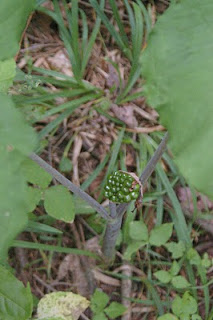Forests and fields make plenty of waste, it just gets put to use. Excrement and dead organisms enrich the soil. Compost is a human adaptation of a very old process. Like a wild sourdough, the trick to a good compost pile is to create a hospitable environment and allow the ubiquitous agents of decay to populate it.
This evening I walked out to our bin in the hot, steamy air which is much more conducive to decomposition than outdoor recreation. The pile smelled more earthy than putrid until I disturbed the surface with a pitchfork. Almost all the kitchen scraps which had spent the week in the pile had lost their identity. Straw-colored stalks and matted leaves clung to form, but dark clumps of nearly finished compost filled in the gaps. Lush green potato plants grew up the sides of the bin, satisfied with the state of decomposition.
Unfortunately we’ve been more focused on the baby than our kitchen, especially during the long labor when food was left all around the house. It’s not that nature abhors a vacuum so much as that a vacuum represents an opportunity, and when we exclude most scavengers but have plenty of food around, there’s an open niche for what can get through. Which in this case was an invasion of tiny ants. They’ll disappear when the counters are clean, only to form long lines for foraging when banana peels take too long to make it to the compost.
Our society is rather fastidious, perhaps too fastidious considering all the power humans exert over our environment. We spent last week at my parents’ house along the River Between Two Countries. A dead carp had washed up on their beach and emitted an aroma of fishy decay that hung about their lawn. We weren’t the only ones to notice the smell. As we discussed whether to push the carcass out into the water and let it wash up on someone else’s shore, a large bird swooped low past the house. We crept out to startle several turkey vultures off the bleached body. Thus began a regular stream of vulture, crow, and even gull visitors. All of them busy cleaning the beach while trying to stay out of our sight.





